The NHS Staff Survey 2019 was released this month.
The Board of Norfolk and Suffolk NHS Foundation Trust (NSFT) has claimed repeatedly that the mental health trust is ‘clinically-led’.
The NHS Staff Survey 2019 results prove once and for all that the claim that NSFT is ‘clinically-led’ is a LIE.
A clinically-led organisation would make a priority of employing staff who have face-to-face contact with patients during cuts, CQC failure and Special Measures. At NSFT, the opposite is true.
The dark blue line is NSFT’s performance.:
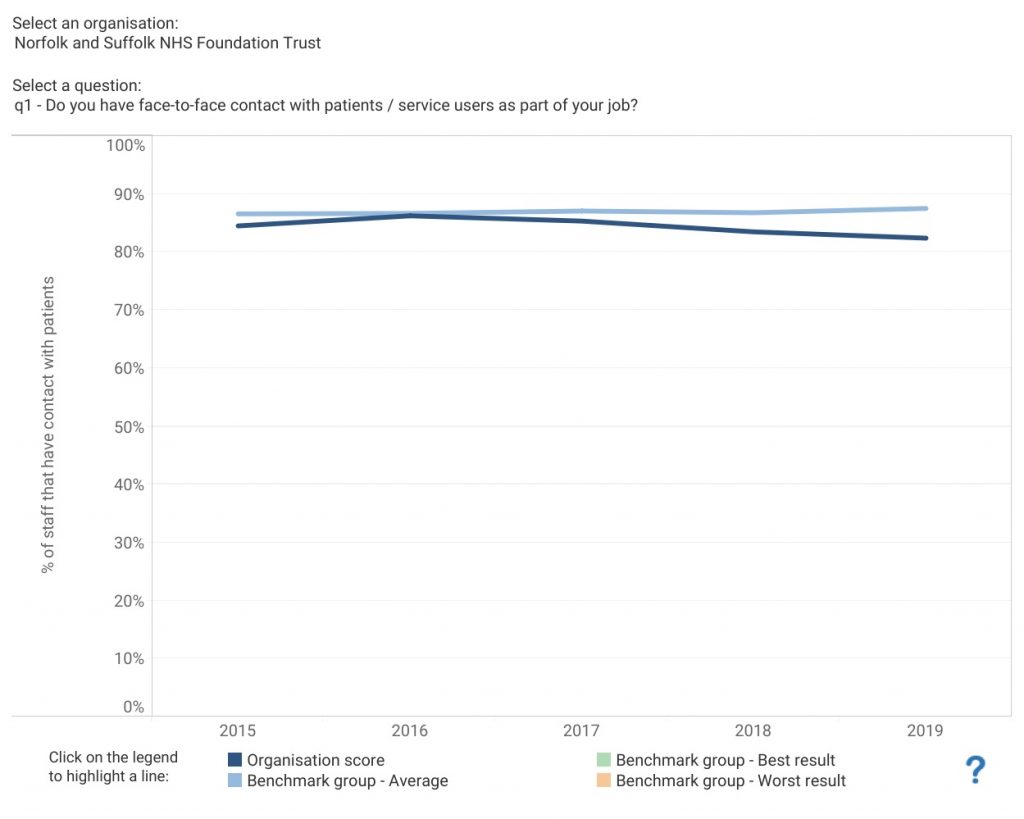
In other mental health trusts, the proportion of staff seeing patients has increased. In 2019, the proportion of NSFT staff seeing patients hit a record low.
A clinically-led organisation would make a priority of having enough staff to get the work done.
NSFT’s performance is the WORST and WORSE since the ‘new’ management took over:
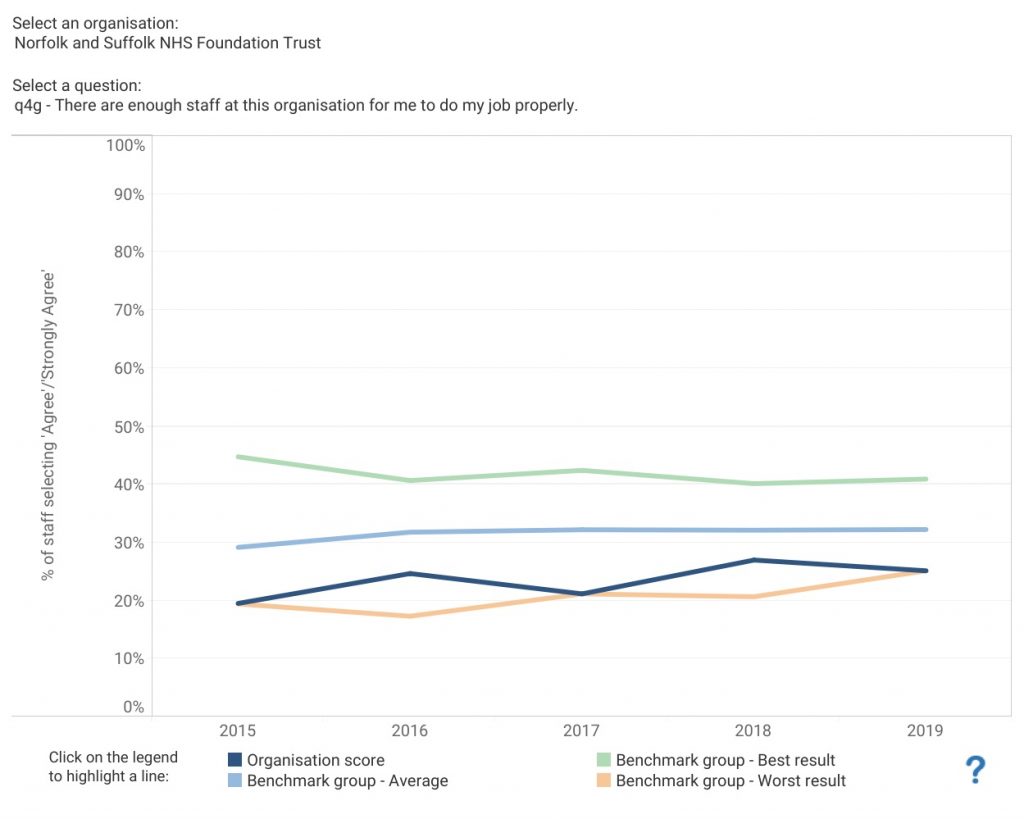
Only one in four NSFT staff believe there are enough staff. This is the WORST performance and WORSE since the ‘new’ management took control.
There is a chasm between staff who see patients and those who don’t.
More than one-third of staff (37.7 per cent) who don’t see patients believe there are enough staff.
But only about one in five staff (21.9 per cent) who regularly see patients believe there are enough staff.
This isn’t what a clinically-led organisation looks like:
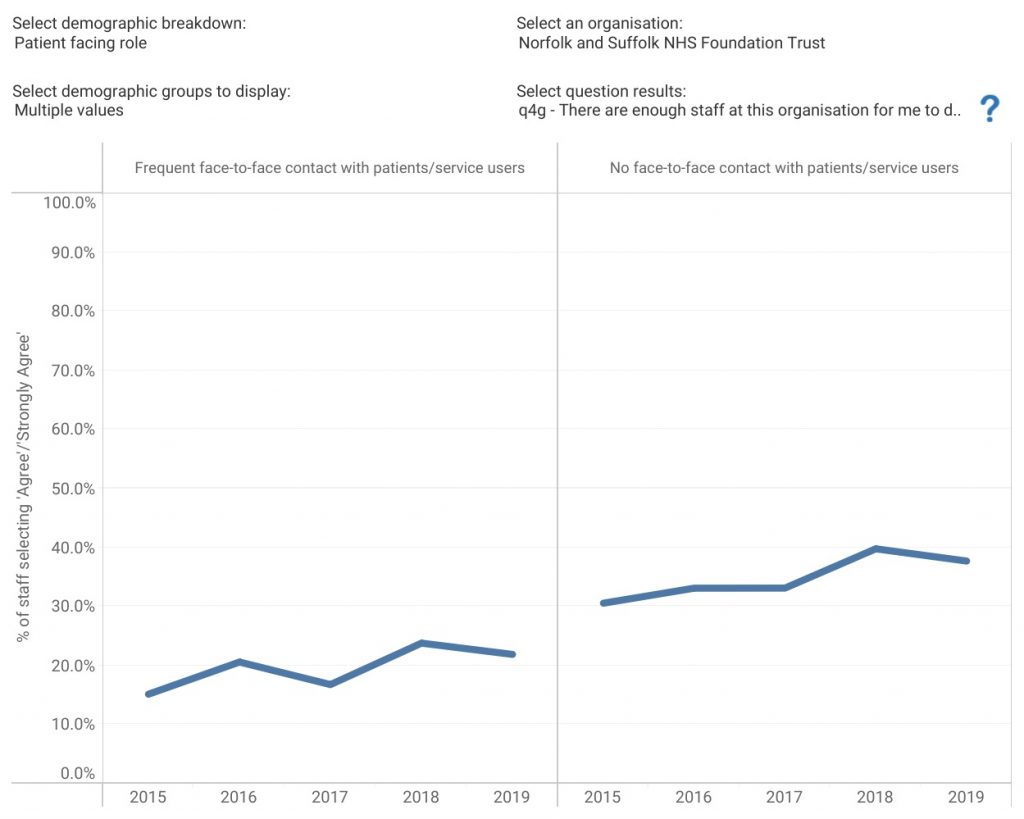
In a clinically-led organisation, staff can make suggestions to improve the work of their team/department.
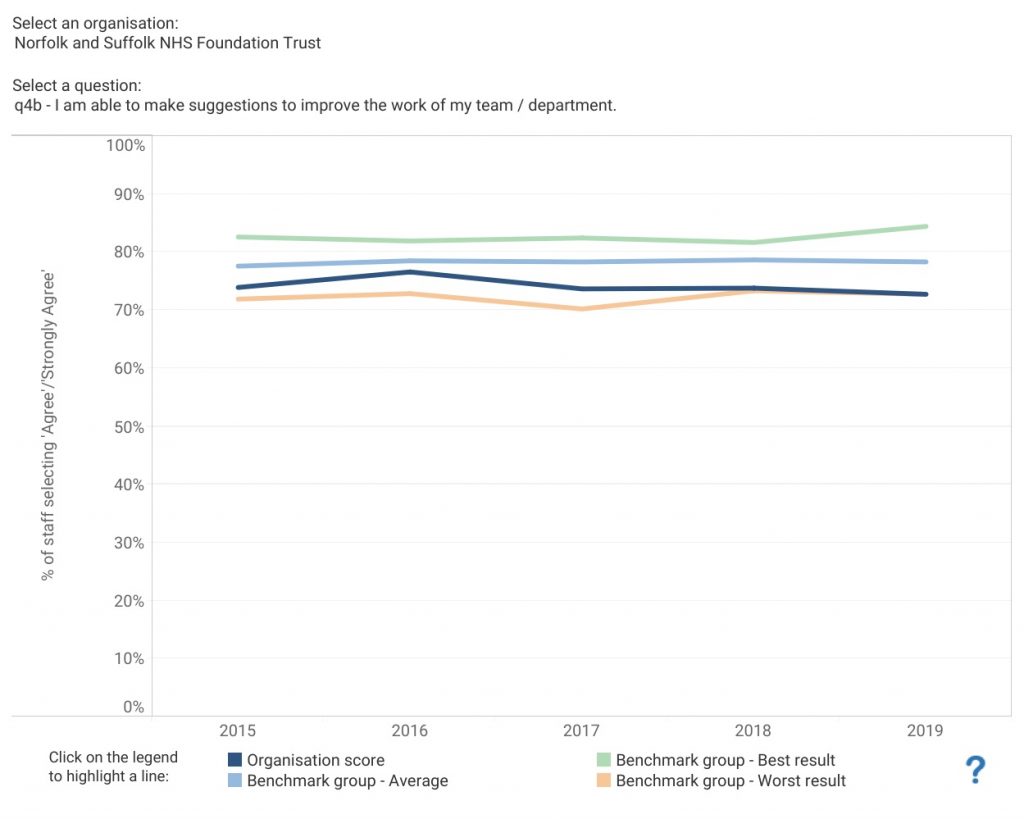
Since the ‘new’ management arrived, performance has got WORSE. In 2015, 2016, 2017 and 2018, NSFT’s performance was bad. But not WORST as it is now.
In a clinically-led organisation, you would expect staff who see patients regularly to have more ability to make suggestions than those with no face-to-face contact with patients.
At NSFT, the opposite is true:
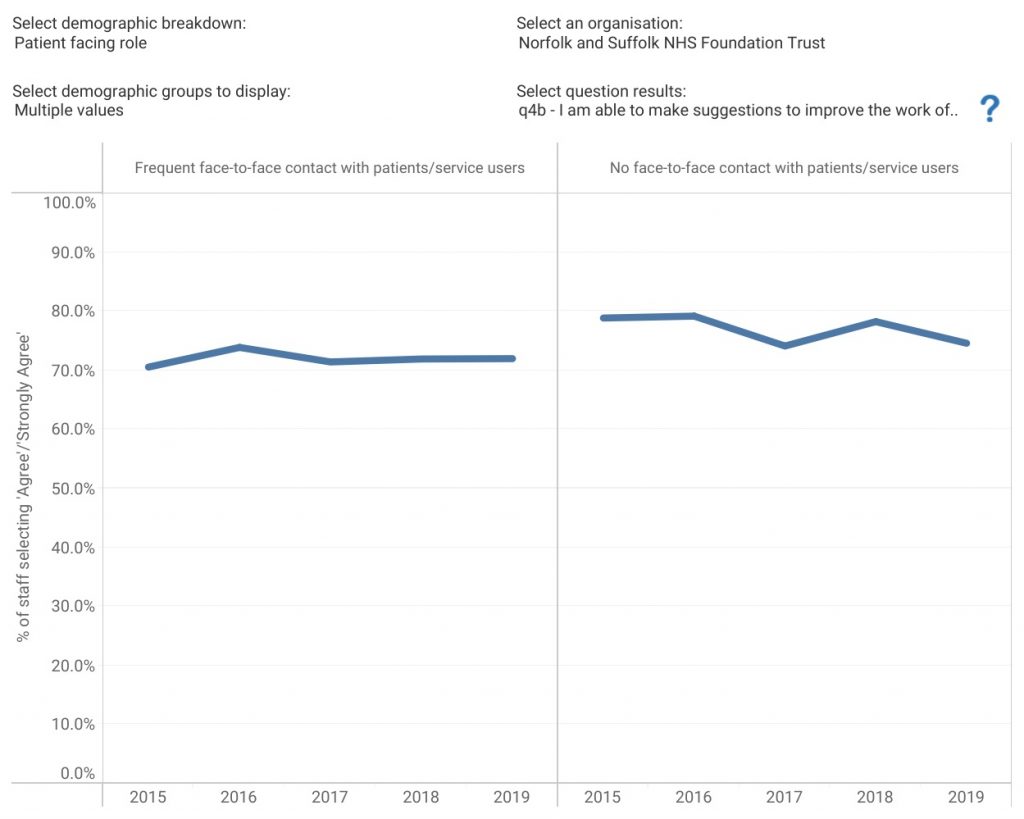
In a clinically-led organisation, staff can make suggestions to improve the work of their team/department.
Once again, NSFT’s performance is the WORST in the country and WORSE since the ‘new’ management took control:
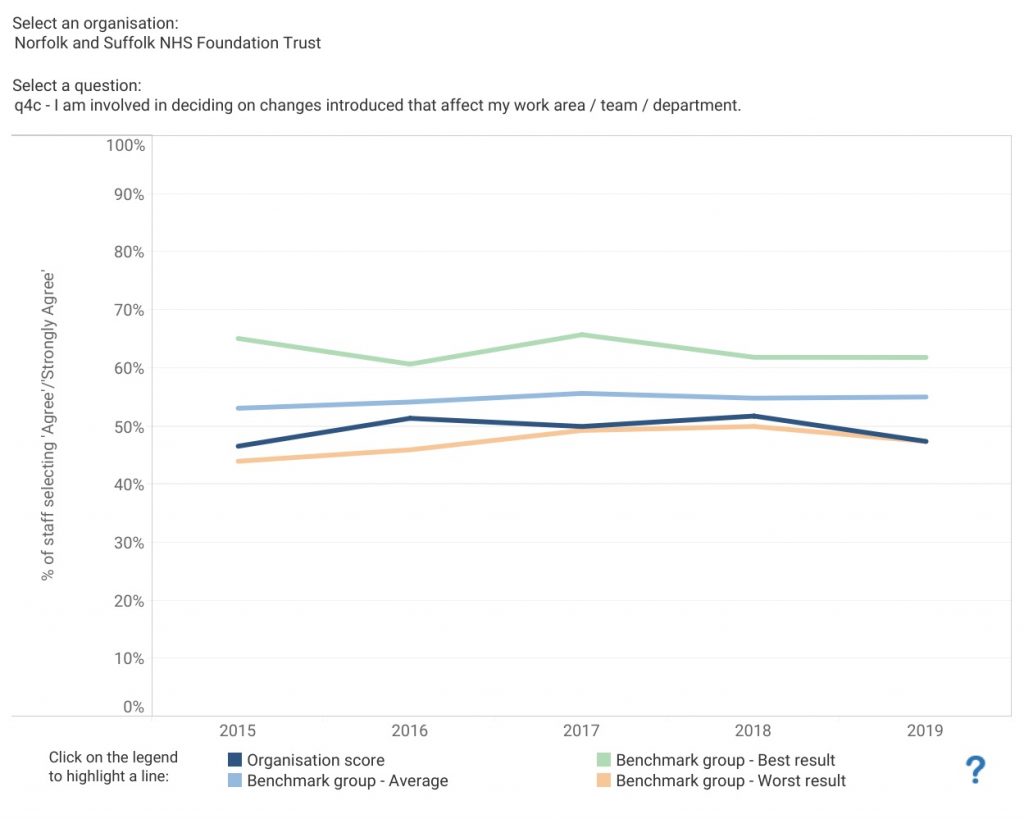
Less than half of NSFT staff believe they are involved in decisions.
Again, staff with regular face-to-face patient contact have considerably less influence on their team / department than those who don’t see patients at all.
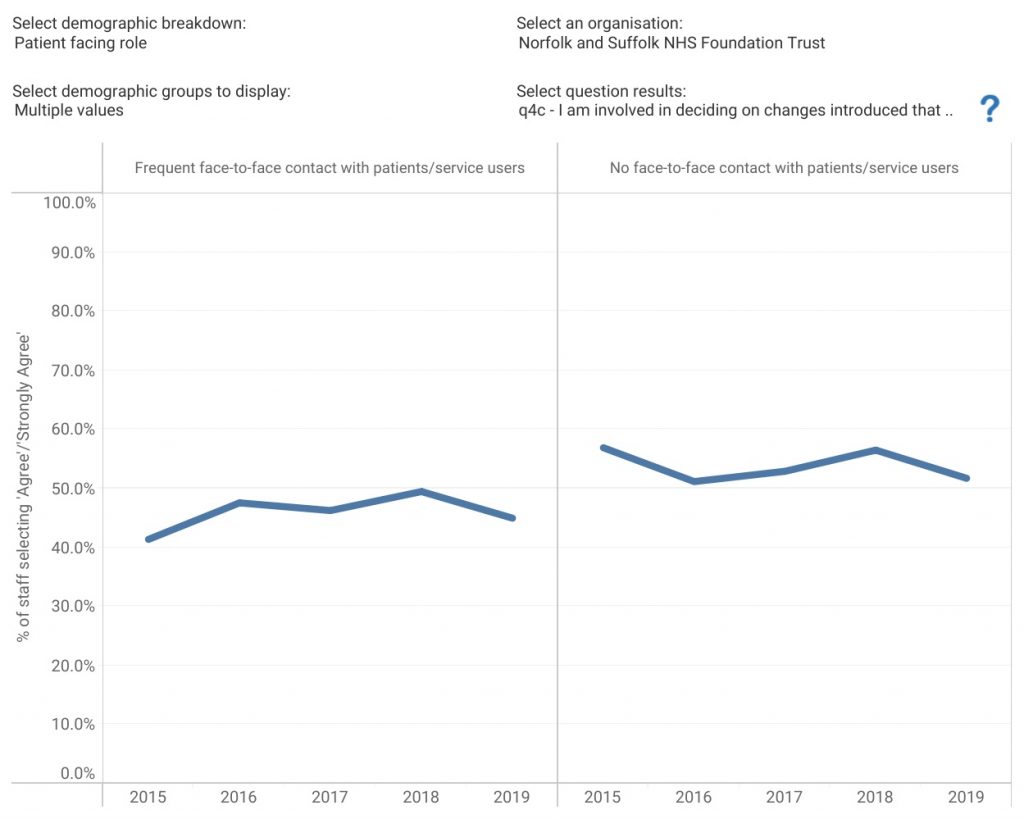
In a clinically-led organisation, staff can make improvements happen.
Again, NSFT is WORST and WORSE since the ‘new’ management:
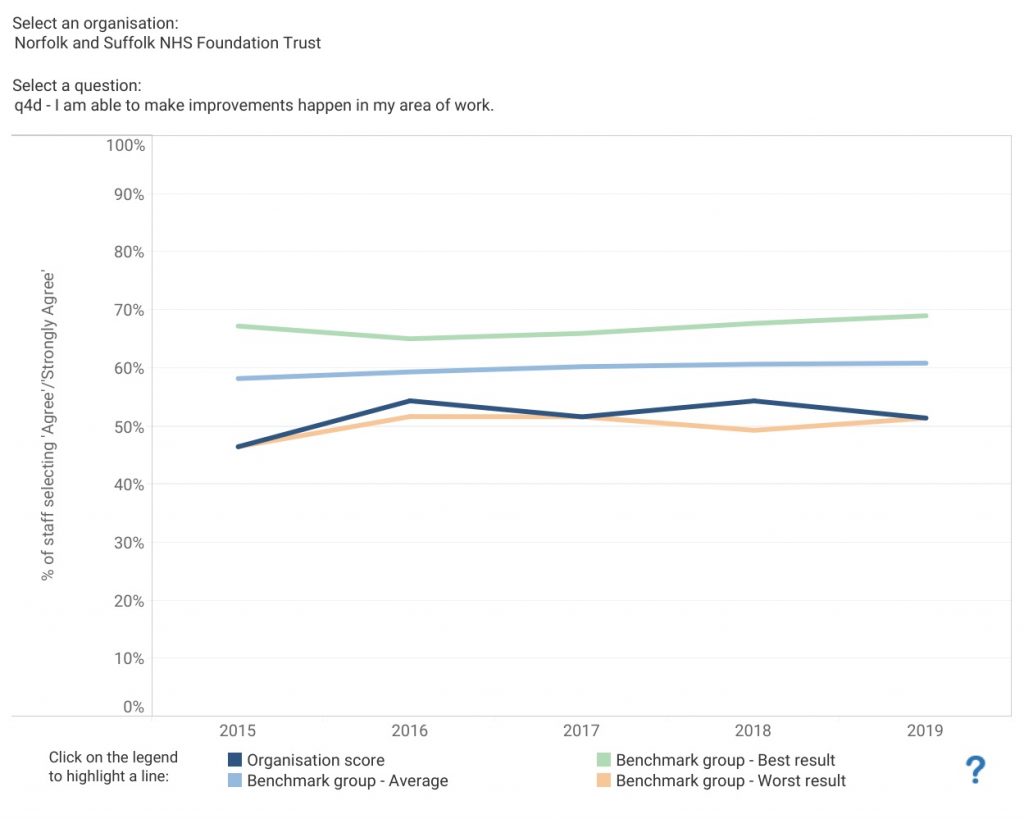
Again, front line staff feel less empowered than those who don’t see patients at all.
Less than half of staff who have face-to-face contact with patients believe they can make improvements happen:
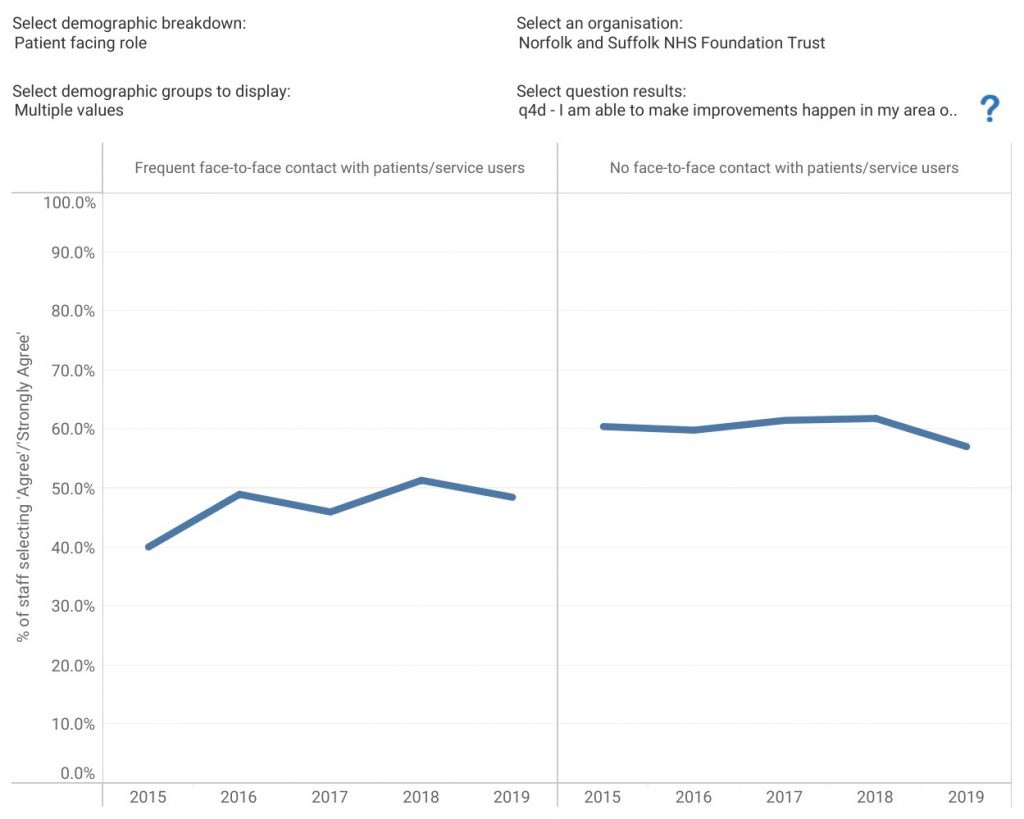
In a clinically-led organisation, staff are supported by their immediate manager.
Once again, NSFT is WORST and WORSE since the ‘new’ management took control:
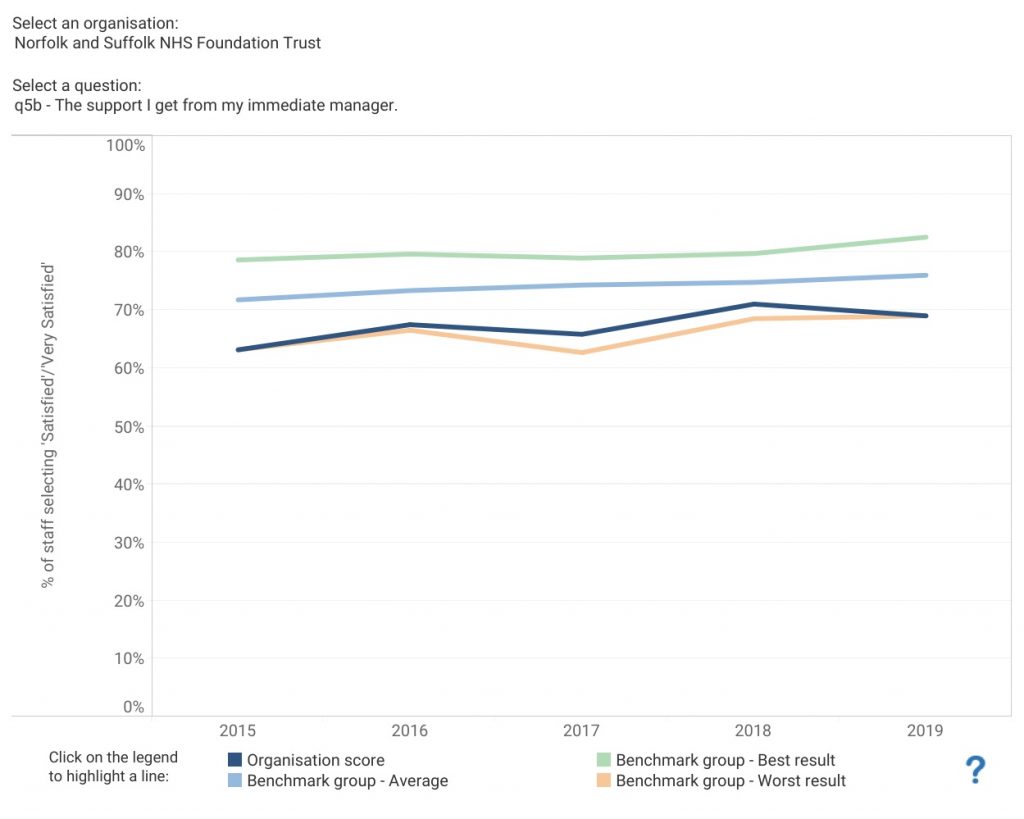
Yet again, front line staff feel significantly less supported than those who don’t see patients at all:
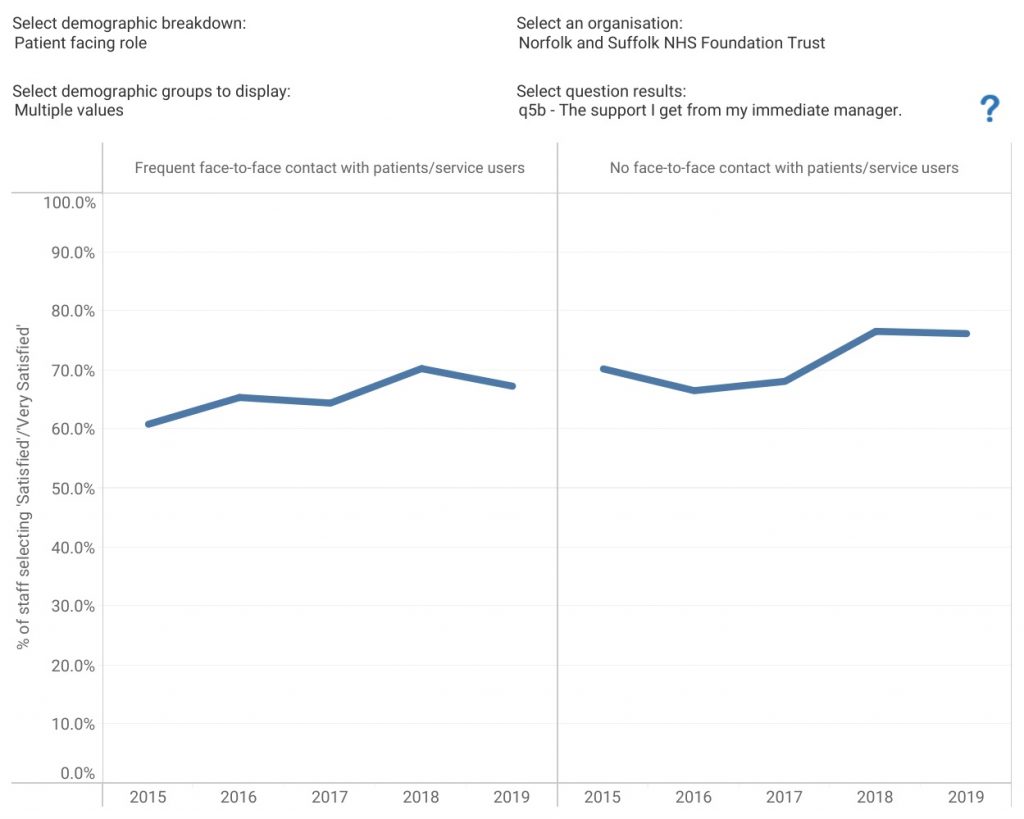
In a clinically-led organisation, staff feel their work is valued.
At NSFT, less than one in four staff believe their work is valued, the WORST performance in the country and WORSE relative to other mental health trusts since the ‘new’ management took control (and remember we’re comparing to Antek Lejk’s time as Chief Executive).
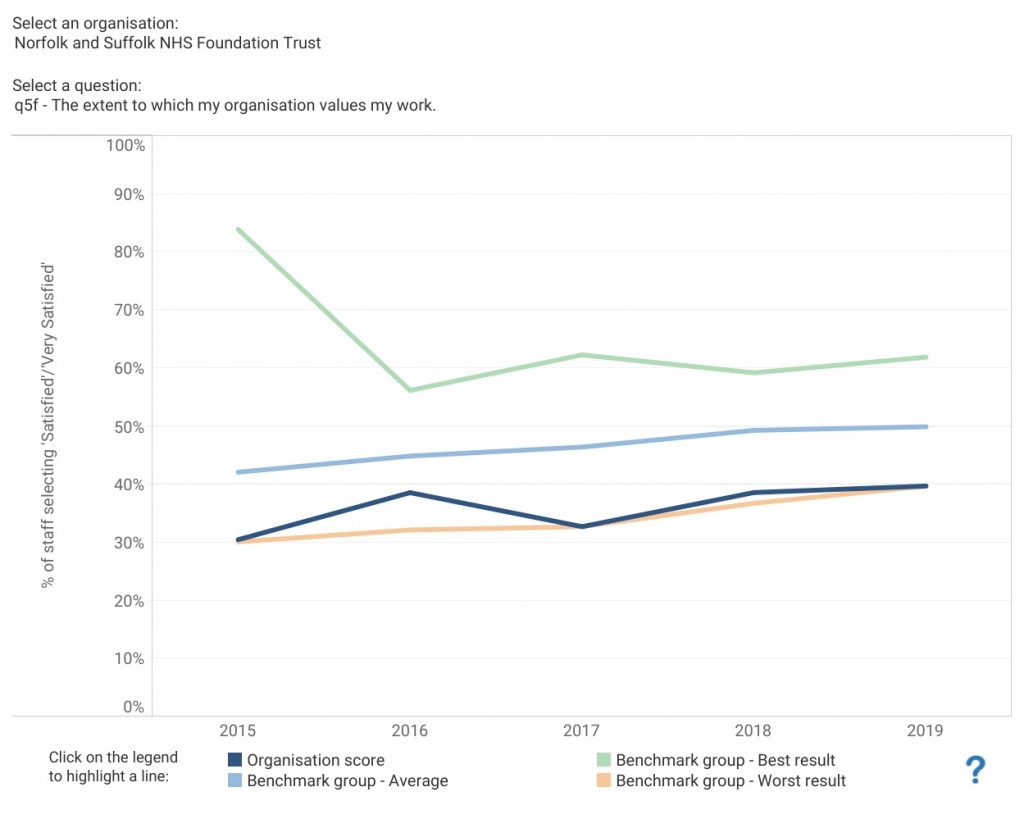
Yet again, front line staff feel significantly less valued than those who have no patient contact:
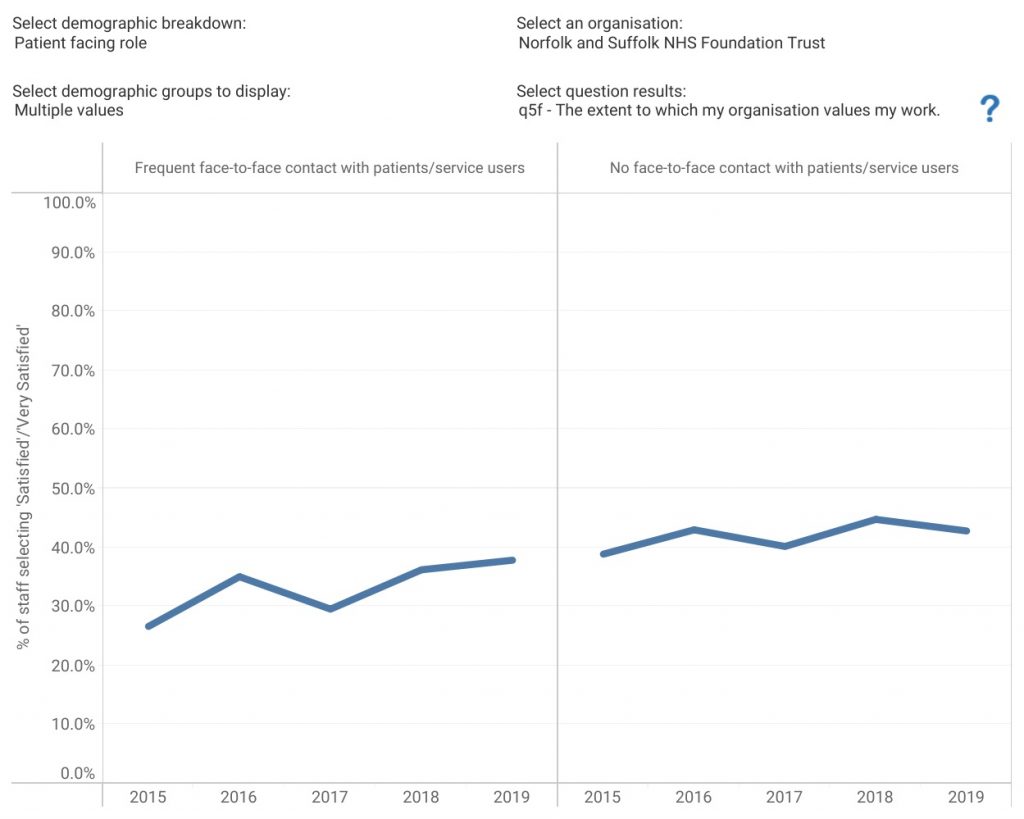
A clinically-led organisation would encourage its staff at work.
Again, NSFT is WORST and WORSE since the ‘new’ management took control:
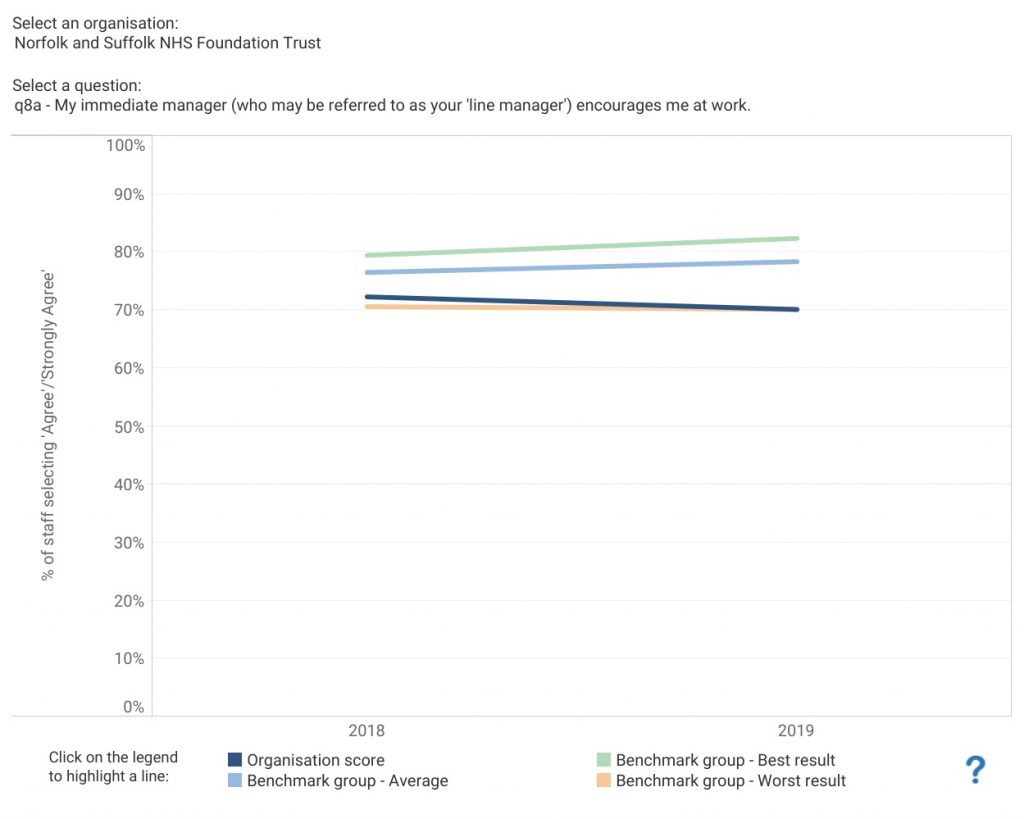
Yet again, front line staff feel significantly less supported than those who don’t see patients at all.
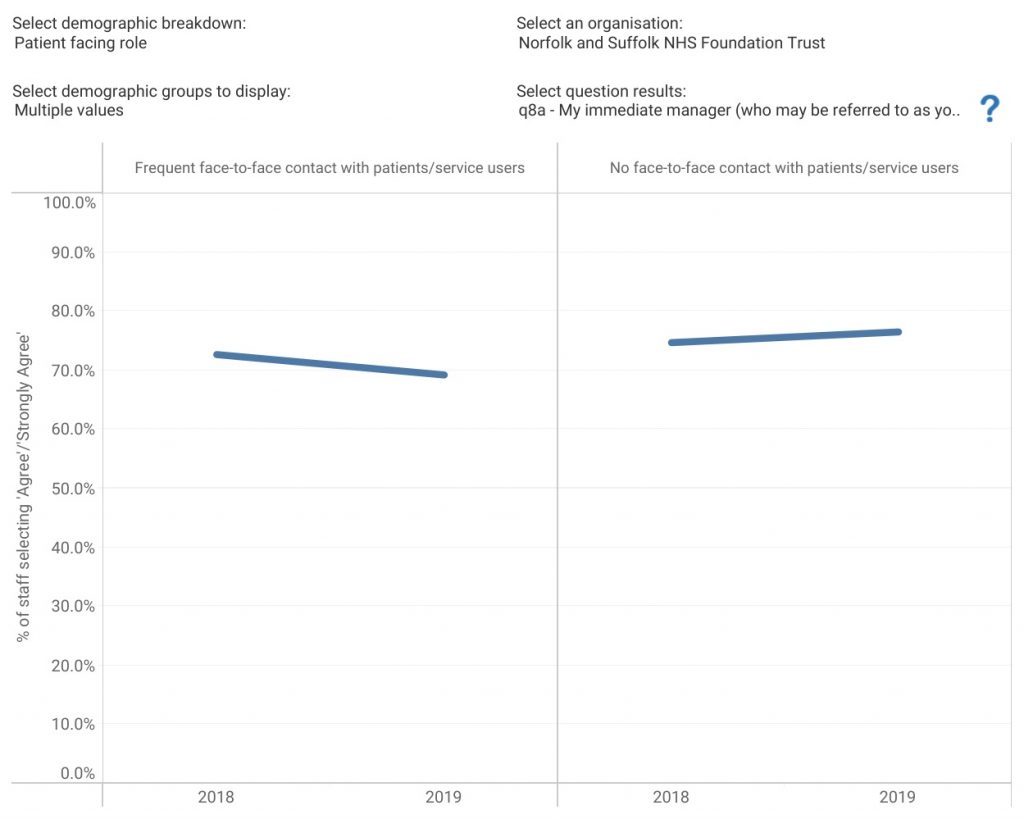
In a clinically-led trust, line managers talk to staff before making changes that affect their work.
Again, NSFT is the WORST in the country and WORSE since the ‘new’ management took control:
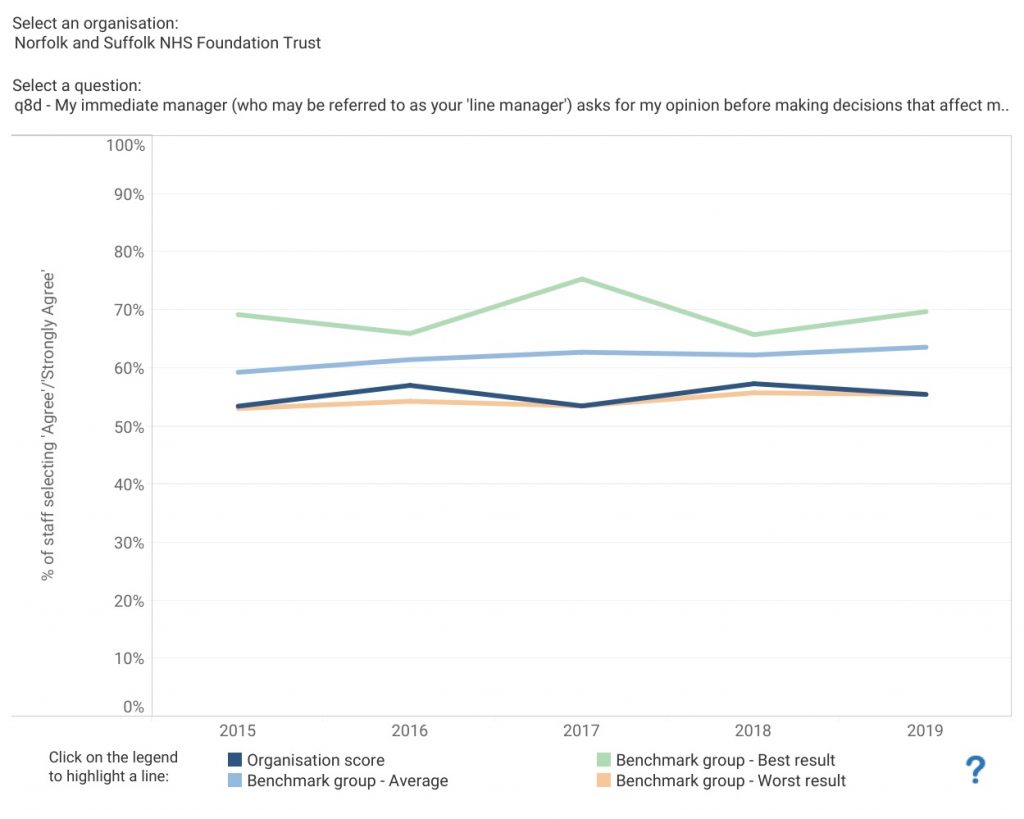
Yet again, front line staff feel significantly less supported than those who don’t see patients at all:
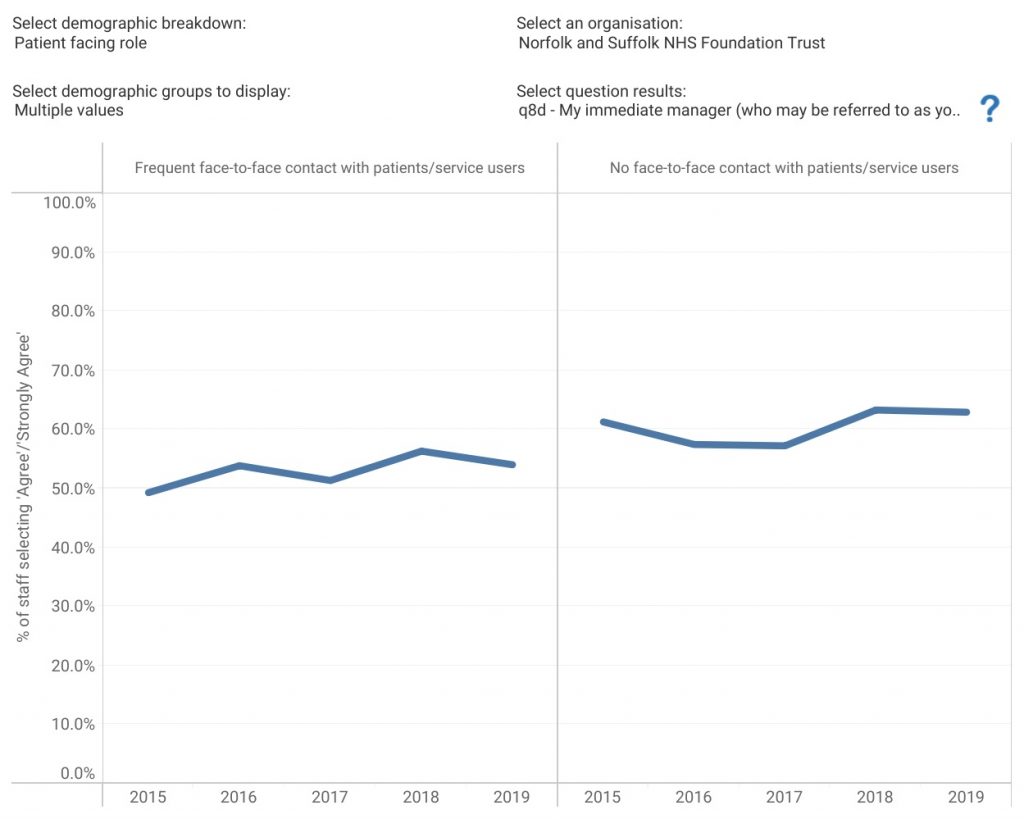
In a clinically-led trust, staff would know who their senior managers are.
Again, NSFT is WORST and FAR WORSE than the before:
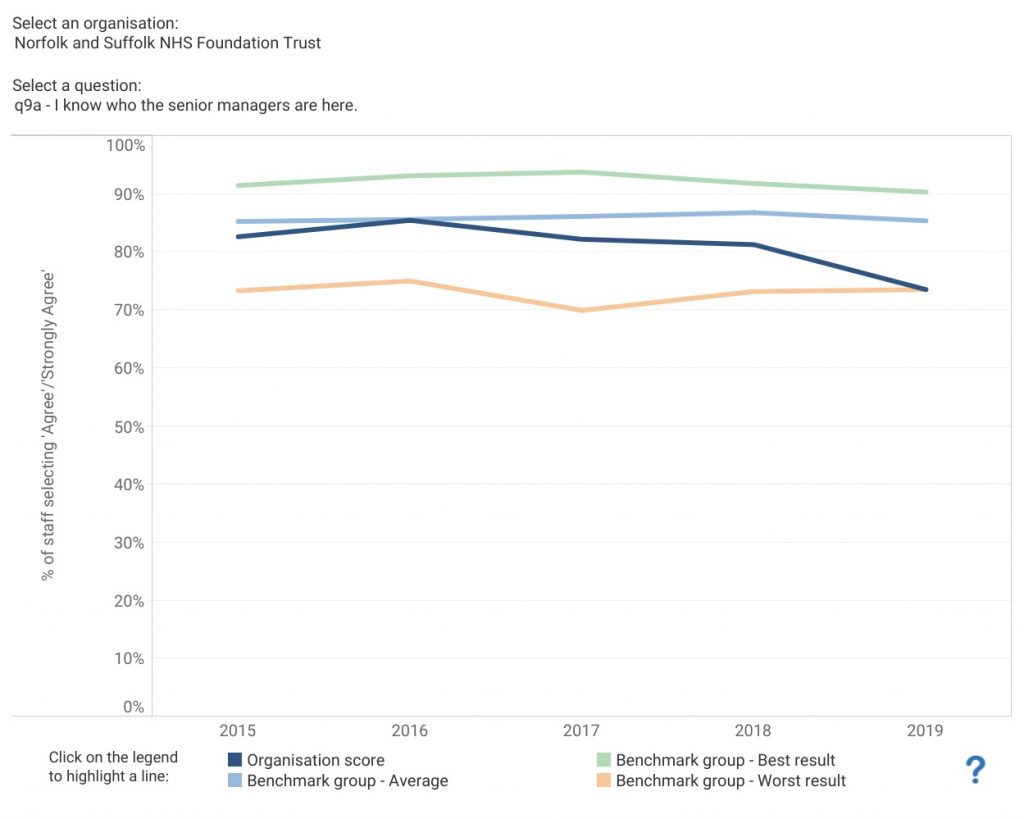
Again, front line staff are significantly less aware of their so-called ‘clinical leadership’ than those who don’t see patients:
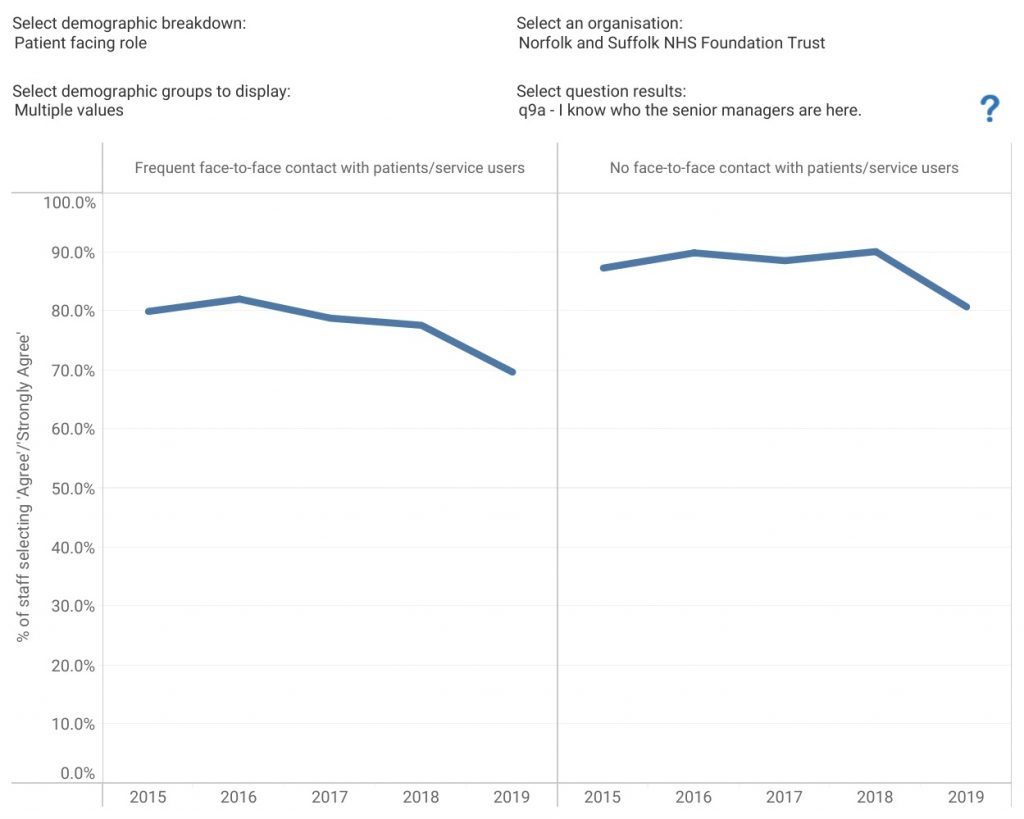
Less than one in three front line staff believe that communication between senior management and staff is effective. Hardly ‘clinically-led’:
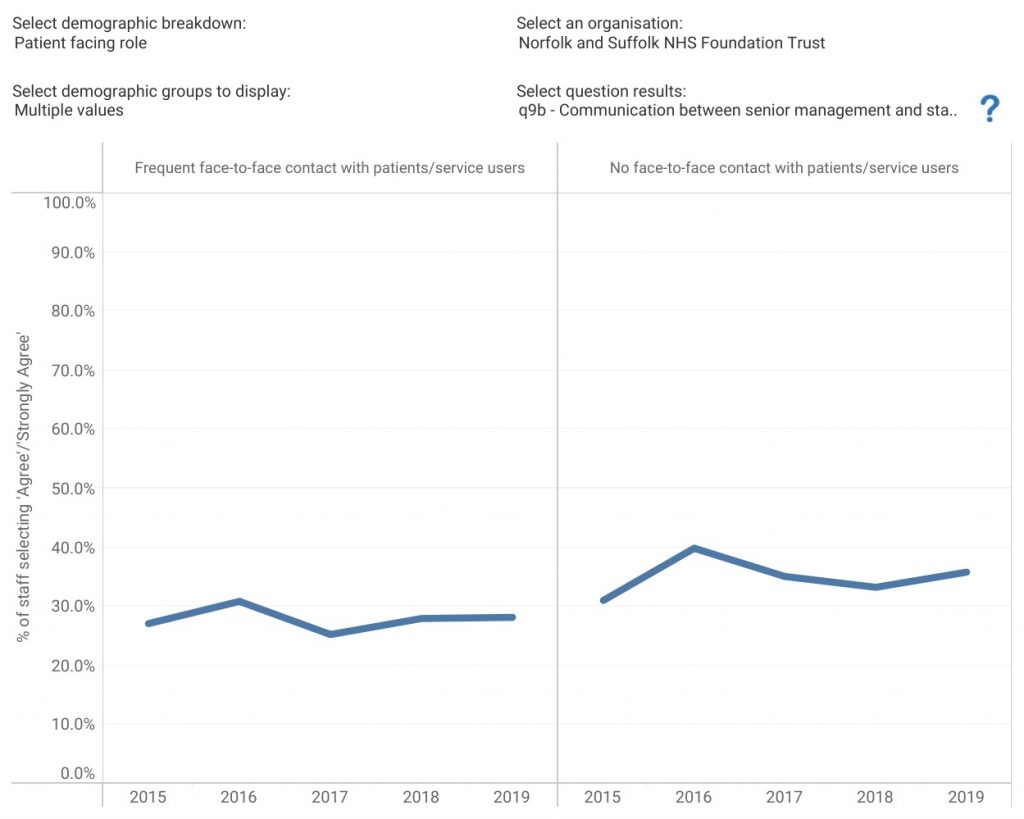
Less than one in three front line staff believe that senior management involve staff in important decisions. Hardly ‘clinically-led’:
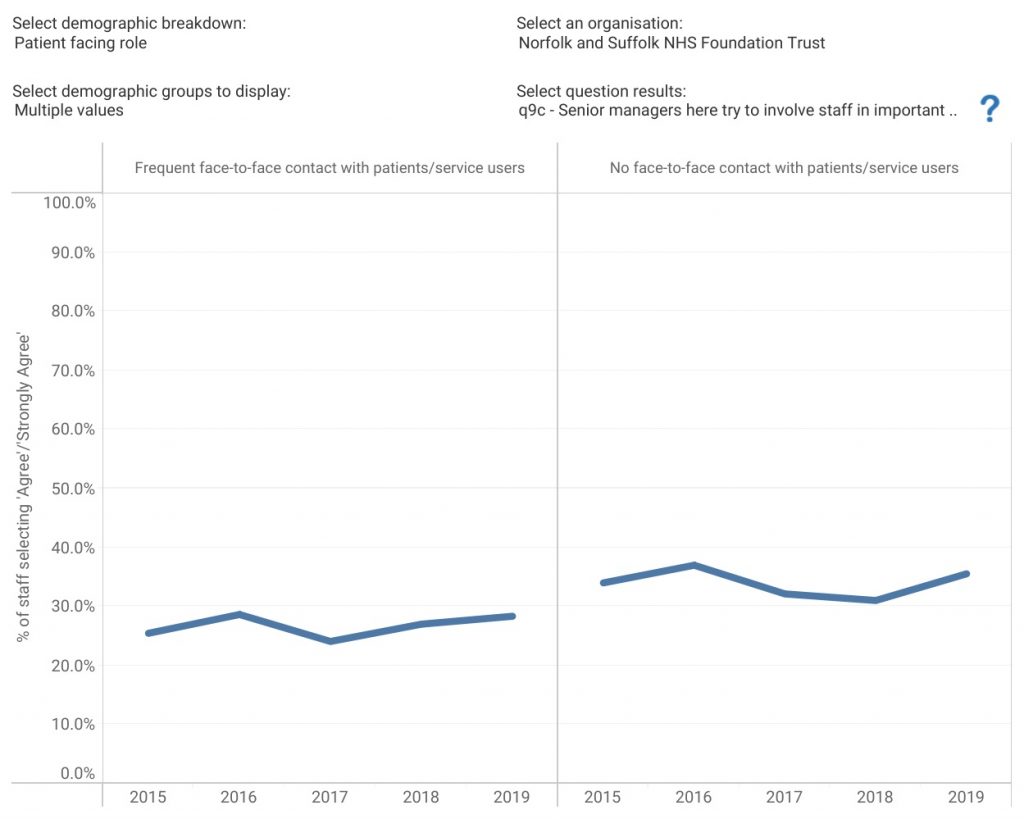
Less than one in four front line staff believe that senior management act on feedback from staff. Hardly ‘clinicially-led’:
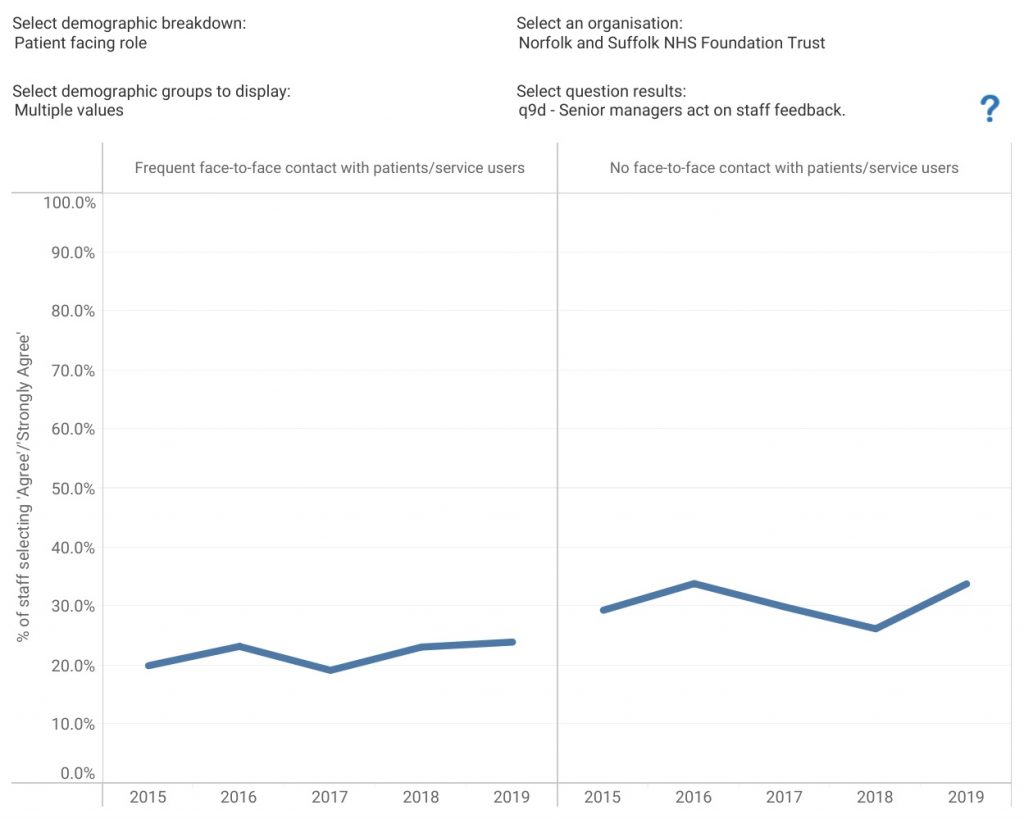
All of this ‘clinical leadership’ has had a devastating effect on the health of NSFT’s own staff.
NSFT’s performance is the WORST for work-related stress in the country and the WORST ever recorded at NSFT:
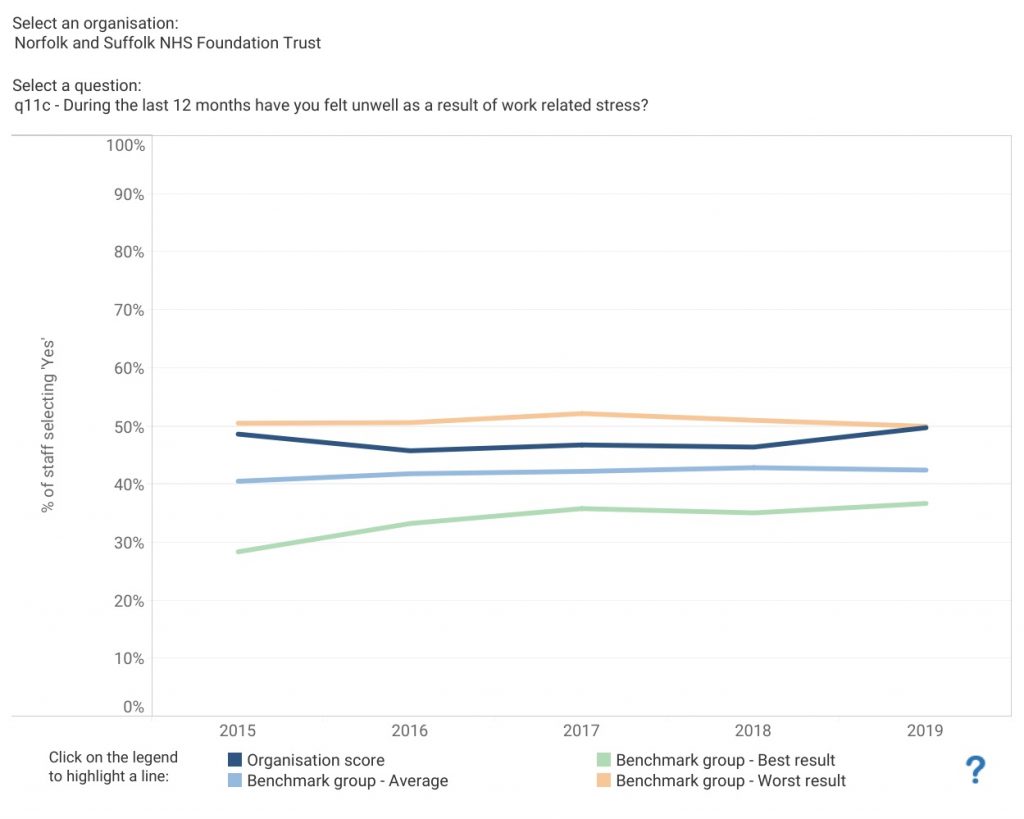
Front line staff who see patients are much, much more likely to experience ill-health as a result of work-related stress. Hardly ‘clinically-led’:
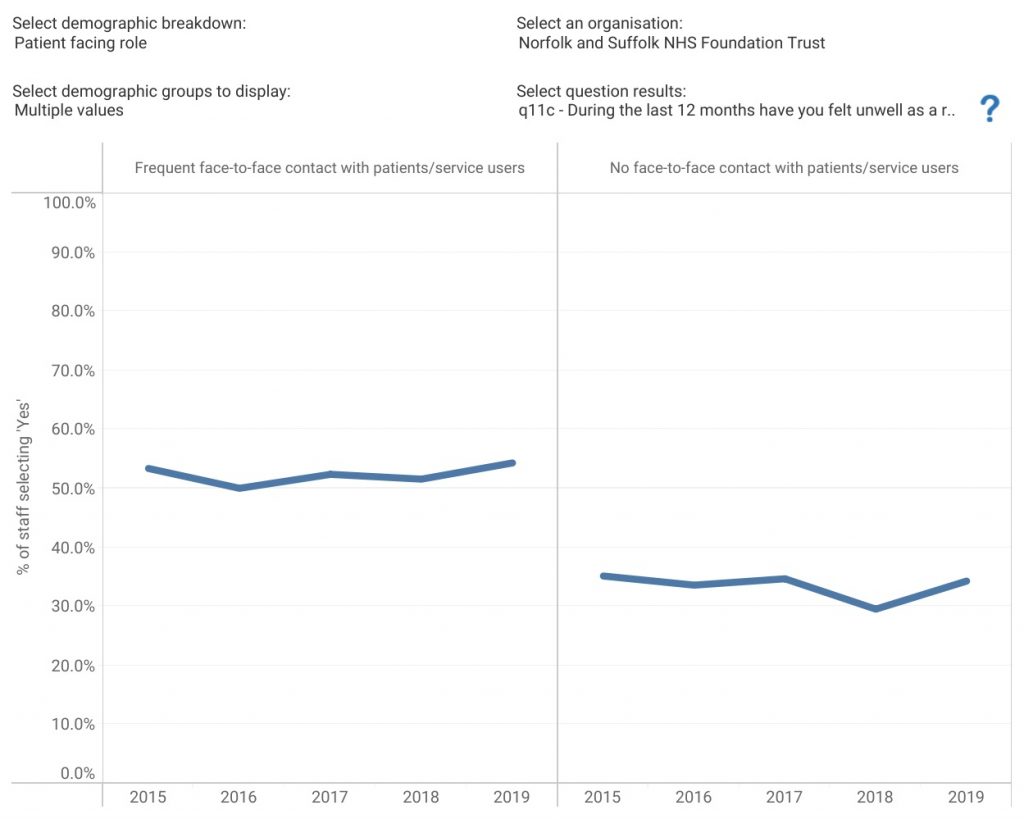
A ‘clinically-led’ organisation would treat staff involved in an error, near miss or incident fairly. Less than half of NSFT staff believe this is true. It is the WORST performance in the country and WORSE since the ‘new’ management took control:
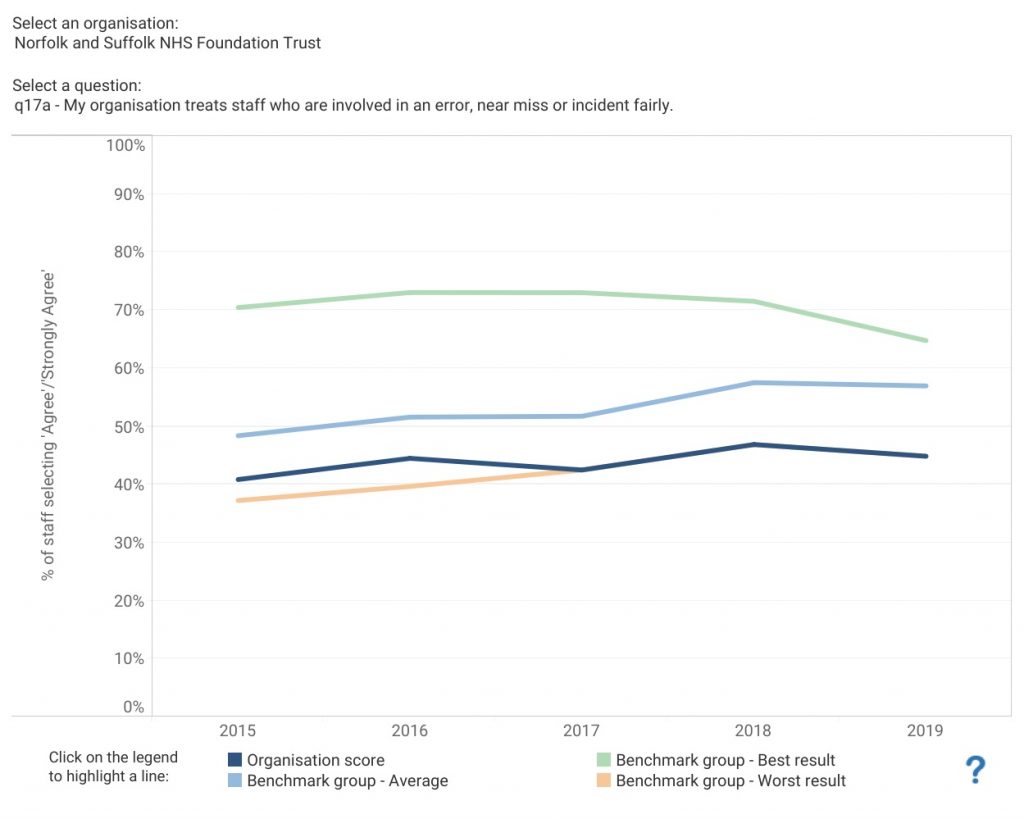
Again, there is a gulf between front line staff and those who don’t see patients:
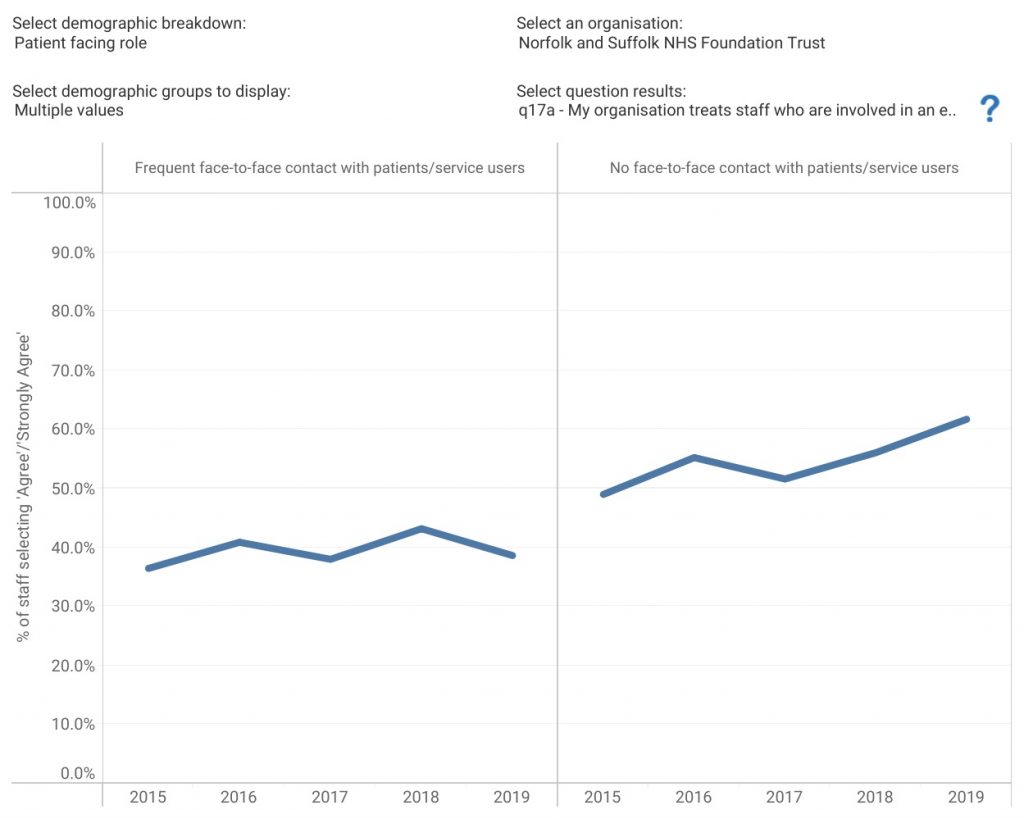
All of this ‘clinical leadership’ has had a devastating effect on staff morale. The proportion of staff often thinking about leaving NSFT is the highest in the country:
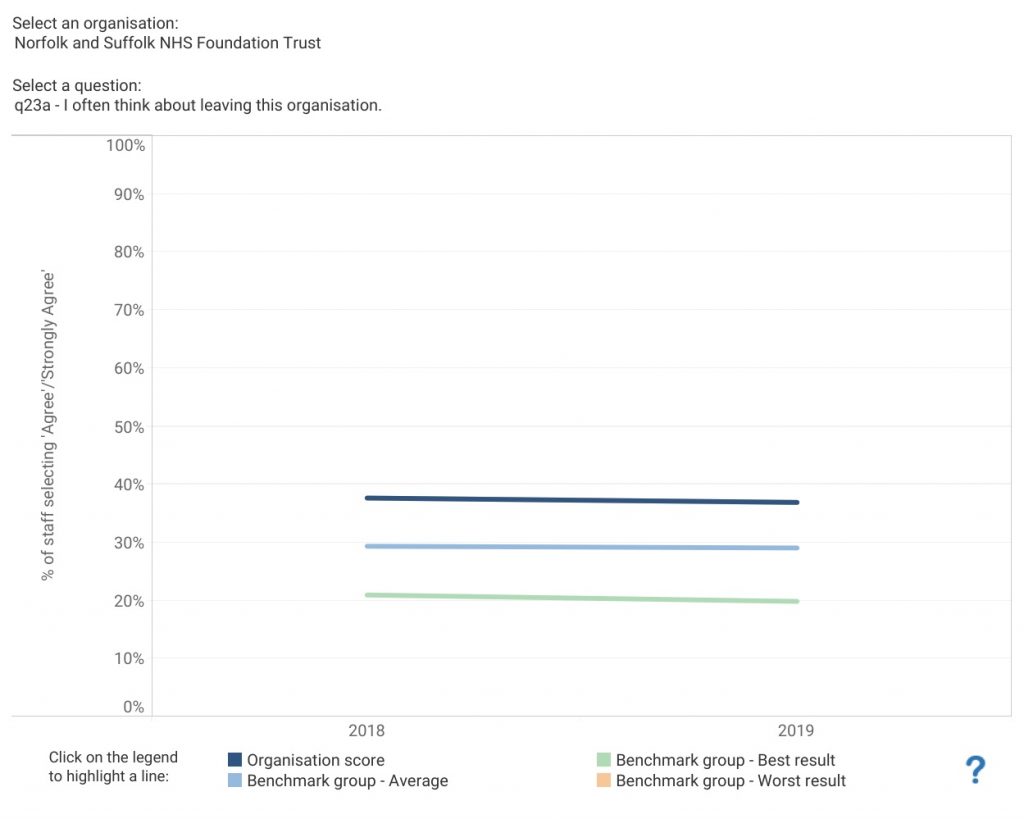
We warned that the disastrous appointments in the radical restructure and the disgraceful re-employment of Amy Eagle as Deputy Chief Operating Officer on a doubled salary would preclude ‘clinical leadership’ and devastate staff morale.
This is exactly what has happened, whatever NSFT’s senior management and its mates at the Care Quality Commission try to stitch-up.
A NHS trust cannot function without its professionals.
The arrogance of the former Professor Jonathan Warren, Chief Executive, and Marie Gabriel, Chair of NSFT, is a catastrophe.
Pride comes before a fall.
No wonder former Professor Warren’s message to staff about the NHS Staff Survey 2019 was so terse.

Outstanding feature
????????????!
?????? ?? ? ??? ?????, ??? ??????????? ?????? ????????? ?????? ? ?????? ???????????? ?????? ??? ????????????? ??????? ???????? ??????????????? ? ??????????? ??????, ?? ????? ?? ???????? ???? ? ?????????? ??????? ?????????? ???????? ??????????, ??? ? ? ?????????.
??? ???, ??? ????? ?????? ? ????????????? ?????????? ? ?????????, ??? ????????????? ????????? ??????? ???????????? ? ????????? ????????? ??????. ?? ????? ??????? ????? ?? ????????? ????????? ??? ?????????? ??????? ? ????????? ?????????????. ?????, ?? ???? ???????, ????????????? ???????? ?????? ??? ?????? ? ????????? ????????? ? ???????? ????? ? ????????? ???????? ? ????????? ?? ??????. ?????? ???????????? ? ????????????? ?? ?????? ?????? ?????? ?????????, ??? ?????????!
??? ?????? ??????
?????? ?????? ? ??????? ???????????
????? ?????? ?????????? ???????!
wonderful post.Ne’er knew this, thankyou for letting me know.
Excellent write-up
What is Alpha Tonic? Alpha Tonic stands as a natural health supplement designed to comprehensively address men’s overall well-being.
Wow, incredible blog format! How lengthy have you ever been blogging for?
you make blogging look easy. The full glance of your website is great,
let alone the content! You can see similar here sklep
Yeah bookmaking this wasn’t a risky conclusion great post! .
obviously like your website however you have to check the spelling on quite a few of your posts. A number of them are rife with spelling issues and I find it very troublesome to inform the reality nevertheless I?¦ll surely come again again.
Lottery Defeater Software? Lottery Defeater is a software application created to help people win lotteries
Thank you for the auspicious writeup. It in fact was a amusement account it. Look advanced to far added agreeable from you! However, how could we communicate?
I gotta favorite this site it seems very beneficial very beneficial
Thankyou for this marvellous post, I am glad I detected this web site on yahoo.
I like this weblog very much, Its a real nice berth to read and get information.
Your place is valueble for me. Thanks!…
Hello.This post was really fascinating, particularly since I was looking for thoughts on this subject last Friday.
It’s a pity you don’t have a donate button! I’d definitely donate to this brilliant blog! I suppose for now i’ll settle for bookmarking and adding your RSS feed to my Google account. I look forward to fresh updates and will talk about this blog with my Facebook group. Chat soon!
Whats up very nice blog!! Man .. Excellent .. Amazing .. I will bookmark your blog and take the feeds also…I’m glad to seek out so many helpful information right here within the publish, we need work out extra techniques in this regard, thanks for sharing. . . . . .
I¦ve recently started a blog, the information you offer on this web site has helped me greatly. Thank you for all of your time & work.
I truly wanted to write a note to appreciate you for all the awesome facts you are posting here. My incredibly long internet research has finally been rewarded with really good suggestions to go over with my family and friends. I ‘d believe that we visitors are undoubtedly lucky to live in a really good site with many outstanding people with helpful concepts. I feel really blessed to have used the webpages and look forward to so many more pleasurable moments reading here. Thanks once more for all the details.
Hello There. I found your blog using msn. This is a very well written article. I will be sure to bookmark it and come back to read more of your useful info. Thanks for the post. I’ll definitely comeback.
of course like your web site but you need to take a look at the spelling on quite a few of your posts. A number of them are rife with spelling issues and I to find it very troublesome to inform the reality then again I will surely come back again.
Prostadine is a 100 natural supplement that helps in ensuring that your prostate remains healthy and functions optimally even as you age. It also helps in reducing symptoms like frequent urination, weak urine stream and urine leakage. With its easy-to-use dropper, you can maintain proper prostate health without any hassle and ensure that you enjoy a healthy life even as you grow older.
I have been absent for some time, but now I remember why I used to love this web site. Thanks , I’ll try and check back more often. How frequently you update your website?
Emperor’s Vigor Tonic is a clinically researched natural male health formula that contains a proprietary blend of carefully selected ingredients. It contains minerals and essential nutrients that improve blood circulation and enhance overall health. The Emperor’s Vigor Tonic energy booster supports male health by addressing a specific enzyme in your body that can boost blood flow and nitric oxide production.
Nagano Lean Body Tonic, also recognized as Nagano Tonic or Lean Body Tonic, represents a powdered nutritional supplement developed by a US-based company specializing in supplements.
This website is my breathing in, very great pattern and perfect subject matter.
The Sumatra Slim Belly Tonic emerges as a groundbreaking solution in the realm of weight management, embodying a tropical formula meticulously crafted to support healthy weight loss. It is a culmination of a proprietary blend featuring eight natural ingredients, each playing a crucial role in fostering an environment conducive to shedding unwanted pounds.
Thanks for sharing excellent informations. Your web site is very cool. I am impressed by the details that you have on this site. It reveals how nicely you perceive this subject. Bookmarked this website page, will come back for more articles. You, my friend, ROCK! I found simply the information I already searched everywhere and just could not come across. What a great web site.
FlowForce Max stands as a natural dietary formula, crafted through recent technological discoveries to specifically address prostate and urinary concerns in men across various age groups. The male supplement features a formulation derived from natural ingredients sourced from local growers.
Thank you for the good writeup. It in fact was a amusement account it. Look advanced to far added agreeable from you! By the way, how can we communicate?
I conceive you have noted some very interesting points, regards for the post.
Greetings! I’ve been following your web site for some time now and finally got the bravery to go ahead and give you a shout out from Kingwood Tx! Just wanted to tell you keep up the excellent job!
Hello, i think that i saw you visited my weblog so i came to “return the favor”.I am attempting to find things to improve my website!I suppose its ok to use a few of your ideas!!
Hi , I do believe this is an excellent blog. I stumbled upon it on Yahoo , i will come back once again. Money and freedom is the best way to change, may you be rich and help other people.
I have recently started a website, the info you provide on this site has helped me tremendously. Thank you for all of your time & work.
I see something genuinely special in this site.
There is evidently a lot to identify about this. I suppose you made various nice points in features also.
You actually make it seem so easy together with your presentation however I find this topic to be actually something that I believe I would by no means understand. It seems too complicated and very vast for me. I am having a look ahead to your subsequent publish, I will attempt to get the cling of it!
Hi, I think your site might be having browser compatibility issues. When I look at your website in Safari, it looks fine but when opening in Internet Explorer, it has some overlapping. I just wanted to give you a quick heads up! Other then that, fantastic blog!
Hello.This post was extremely remarkable, especially since I was investigating for thoughts on this subject last Saturday.
What¦s Taking place i am new to this, I stumbled upon this I have found It positively useful and it has helped me out loads. I hope to give a contribution & aid different customers like its helped me. Good job.
It¦s really a nice and useful piece of information. I¦m satisfied that you just shared this useful information with us. Please keep us up to date like this. Thanks for sharing.
An interesting discussion is worth comment. I think that you should write more on this topic, it might not be a taboo subject but generally people are not enough to speak on such topics. To the next. Cheers
I am glad that I observed this web blog, precisely the right info that I was looking for! .
Appreciate it for helping out, superb info. “Considering how dangerous everything is, nothing is really very frightening.” by Gertrude Stein.
It is actually a nice and helpful piece of info. I’m satisfied that you just shared this useful information with us. Please keep us up to date like this. Thanks for sharing.
Wonderful blog! Do you have any helpful hints for aspiring writers? I’m planning to start my own blog soon but I’m a little lost on everything. Would you advise starting with a free platform like WordPress or go for a paid option? There are so many choices out there that I’m completely overwhelmed .. Any tips? Thanks a lot!
I am glad to be one of the visitors on this great web site (:, regards for putting up.
FitSpresso is a weight loss supplement developed using clinically proven ingredients extracted from natural sources.
Superb blog! Do you have any tips for aspiring writers? I’m planning to start my own site soon but I’m a little lost on everything. Would you recommend starting with a free platform like WordPress or go for a paid option? There are so many choices out there that I’m totally confused .. Any ideas? Thanks!
I besides think hence, perfectly written post! .
Whats up this is kind of of off topic but I was wanting to know if blogs use WYSIWYG editors or if you have to manually code with HTML. I’m starting a blog soon but have no coding expertise so I wanted to get guidance from someone with experience. Any help would be greatly appreciated!
Hello.This post was extremely fascinating, especially since I was investigating for thoughts on this matter last Sunday.
Great wordpress blog here.. It’s hard to find quality writing like yours these days. I really appreciate people like you! take care
Hello. excellent job. I did not anticipate this. This is a excellent story. Thanks!
There is noticeably a bundle to know about this. I assume you made certain nice points in features also.
I think other web site proprietors should take this website as an model, very clean and fantastic user friendly style and design, as well as the content. You are an expert in this topic!
I’d have to test with you here. Which is not something I often do! I enjoy studying a put up that can make individuals think. Also, thanks for permitting me to remark!
The next time I read a blog, I hope that it doesnt disappoint me as much as this one. I mean, I know it was my choice to read, but I actually thought youd have something interesting to say. All I hear is a bunch of whining about something that you could fix if you werent too busy looking for attention.
I wanted to thank you for this great read!! I definitely enjoying every little bit of it I have you bookmarked to check out new stuff you post…
I think this is among the most vital information for me. And i am glad reading your article. But should remark on some general things, The website style is ideal, the articles is really excellent : D. Good job, cheers
Very interesting subject, thank you for posting.
Those are yours alright! . We at least need to get these people stealing images to start blogging! They probably just did a image search and grabbed them. They look good though!
I am continuously browsing online for posts that can aid me. Thank you!
of course like your website however you have to take a look at the spelling on several of your posts. Several of them are rife with spelling issues and I find it very troublesome to tell the truth nevertheless I’ll surely come again again.
Well I sincerely liked reading it. This post offered by you is very useful for proper planning.
Helpful information. Lucky me I discovered your web site accidentally, and I am shocked why this coincidence did not came about earlier! I bookmarked it.
I envy your work, appreciate it for all the informative articles.
I am continually searching online for posts that can assist me. Thx!
You could certainly see your expertise in the work you write. The arena hopes for more passionate writers such as you who aren’t afraid to mention how they believe. All the time follow your heart.
You really make it seem so easy with your presentation but I find this topic to be actually something that I think I would never understand. It seems too complex and very broad for me. I’m looking forward for your next post, I’ll try to get the hang of it!
Great post. I am facing a couple of these problems.
I like what you guys are up also. Such intelligent work and reporting! Carry on the excellent works guys I have incorporated you guys to my blogroll. I think it’ll improve the value of my site 🙂
There is noticeably a bundle to know about this. I assume you made certain nice points in features also.
What i do not realize is in truth how you’re now not really much more smartly-preferred than you may be now. You are very intelligent. You recognize therefore considerably in terms of this matter, produced me for my part believe it from a lot of various angles. Its like women and men don’t seem to be interested except it is one thing to do with Lady gaga! Your own stuffs nice. All the time care for it up!
of course like your website however you have to test the spelling on quite a few of your posts. A number of them are rife with spelling problems and I to find it very troublesome to inform the reality on the other hand I will definitely come back again.
I would like to thank you for the efforts you’ve put in writing this site. I’m hoping the same high-grade blog post from you in the upcoming as well. Actually your creative writing abilities has inspired me to get my own blog now. Actually the blogging is spreading its wings quickly. Your write up is a good example of it.
Hi, Neat post. There is a problem with your web site in internet explorer, would test this… IE still is the market leader and a huge portion of people will miss your fantastic writing due to this problem.
wonderful points altogether, you just gained a brand new reader. What would you recommend about your post that you made a few days ago? Any positive?
I like what you guys are up too. Such smart work and reporting! Carry on the superb works guys I have incorporated you guys to my blogroll. I think it will improve the value of my web site 🙂
Do you have a spam issue on this site; I also am a blogger, and I was curious about your situation; many of us have developed some nice practices and we are looking to swap strategies with other folks, please shoot me an email if interested.
Cool blog! Is your theme custom made or did you download it from somewhere? A design like yours with a few simple tweeks would really make my blog jump out. Please let me know where you got your design. Appreciate it
I appreciate, cause I found exactly what I was looking for. You have ended my 4 day long hunt! God Bless you man. Have a great day. Bye
I like this blog very much, Its a really nice position to read and incur information.
This is very interesting, You are a very skilled blogger. I have joined your feed and look forward to seeking more of your wonderful post. Also, I’ve shared your website in my social networks!
I’m curious to find out what blog platform you have been utilizing? I’m experiencing some minor security issues with my latest website and I’d like to find something more risk-free. Do you have any suggestions?
Hey there! This is my first visit to your blog! We are a team of volunteers and starting a new project in a community in the same niche. Your blog provided us valuable information to work on. You have done a outstanding job!
I appreciate, cause I found just what I was looking for. You have ended my 4 day long hunt! God Bless you man. Have a nice day. Bye
Hi, i think that i saw you visited my web site thus i came to “return the favor”.I’m attempting to find things to enhance my website!I suppose its ok to use some of your ideas!!
I’m no longer positive the place you’re getting your information, but good topic. I must spend some time finding out much more or working out more. Thanks for great info I used to be searching for this info for my mission.
This is the best weblog for anybody who needs to find out about this topic. You notice so much its nearly hard to argue with you (not that I truly would need…HaHa). You undoubtedly put a brand new spin on a subject thats been written about for years. Great stuff, just nice!
You could definitely see your expertise in the paintings you write. The arena hopes for more passionate writers such as you who aren’t afraid to mention how they believe. At all times follow your heart.
Good – I should definitely pronounce, impressed with your website. I had no trouble navigating through all the tabs and related information ended up being truly simple to do to access. I recently found what I hoped for before you know it at all. Quite unusual. Is likely to appreciate it for those who add forums or something, site theme . a tones way for your client to communicate. Nice task.
Thanks for sharing excellent informations. Your site is very cool. I’m impressed by the details that you’ve on this website. It reveals how nicely you understand this subject. Bookmarked this website page, will come back for more articles. You, my friend, ROCK! I found just the info I already searched all over the place and just could not come across. What a perfect web site.
Appreciating the time and effort you put into your site and in depth information you provide. It’s nice to come across a blog every once in a while that isn’t the same outdated rehashed information. Wonderful read! I’ve bookmarked your site and I’m adding your RSS feeds to my Google account.
This really answered my problem, thank you!
It?¦s really a great and useful piece of information. I am satisfied that you simply shared this helpful info with us. Please stay us up to date like this. Thank you for sharing.
I have recently started a web site, the info you offer on this site has helped me greatly. Thanks for all of your time & work.
Thank you for the sensible critique. Me and my neighbor were just preparing to do some research on this. We got a grab a book from our local library but I think I learned more from this post. I’m very glad to see such fantastic information being shared freely out there.
There are actually a whole lot of details like that to take into consideration. That could be a nice level to convey up. I provide the ideas above as basic inspiration but clearly there are questions like the one you bring up the place crucial thing shall be working in honest good faith. I don?t know if finest practices have emerged around things like that, but I’m positive that your job is clearly identified as a good game. Each girls and boys feel the impression of just a second’s pleasure, for the rest of their lives.
I believe you have noted some very interesting points, thankyou for the post.
Woh I like your posts, saved to favorites! .
My partner and I stumbled over here from a different web address and thought I should check things out. I like what I see so i am just following you. Look forward to checking out your web page again.
I am extremely impressed with your writing skills as well as with the layout on your weblog. Is this a paid theme or did you customize it yourself? Either way keep up the excellent quality writing, it’s rare to see a nice blog like this one today..
Very superb visual appeal on this site, I’d value it 10 10.
Pretty section of content. I just stumbled upon your blog and in accession capital to assert that I acquire actually enjoyed account your blog posts. Any way I will be subscribing in your augment or even I fulfillment you access constantly rapidly.
I think other site proprietors should take this web site as an model, very clean and wonderful user friendly style and design, as well as the content. You’re an expert in this topic!
F*ckin¦ remarkable things here. I¦m very happy to look your article. Thank you so much and i’m taking a look ahead to touch you. Will you please drop me a e-mail?
Good – I should definitely pronounce, impressed with your web site. I had no trouble navigating through all the tabs as well as related information ended up being truly easy to do to access. I recently found what I hoped for before you know it in the least. Quite unusual. Is likely to appreciate it for those who add forums or something, web site theme . a tones way for your customer to communicate. Excellent task..
I love it when people come together and share opinions, great blog, keep it up.
CasinoXVNP.com is the Best Online Casino Guide for Players from English Speaking Countries. North America, Canada, Europe, Australia, South Africa & India can access over 20.000 Free games. On this page, we will give you everything you need to know and more about how and where to play real money casino games online. Find the Best Online Casino USA on CasinoXVNP.COM.
You have brought up a very superb points, regards for the post.
Very good written post. It will be beneficial to anybody who utilizes it, including yours truly :). Keep up the good work – can’r wait to read more posts.
It’s really a great and useful piece of information. I am glad that you shared this helpful info with us. Please keep us informed like this. Thanks for sharing.
Wow, awesome blog layout! How long have you been blogging for? you made blogging look easy. The overall look of your website is magnificent, let alone the content!
I’ve recently started a site, the info you provide on this web site has helped me greatly. Thanks for all of your time & work.
I couldn’t resist commenting
Great ?V I should definitely pronounce, impressed with your website. I had no trouble navigating through all tabs as well as related info ended up being truly simple to do to access. I recently found what I hoped for before you know it at all. Quite unusual. Is likely to appreciate it for those who add forums or something, web site theme . a tones way for your customer to communicate. Excellent task..
whoah this weblog is fantastic i love reading your posts. Stay up the good paintings! You realize, a lot of persons are searching around for this information, you can aid them greatly.
Very nice post. I just stumbled upon your blog and wanted to say that I’ve truly enjoyed browsing your blog posts. In any case I will be subscribing to your feed and I hope you write again very soon!
I am constantly invstigating online for posts that can facilitate me. Thx!
I don’t even know how I ended up here, but I thought this post was great. I do not know who you are but definitely you’re going to a famous blogger if you aren’t already 😉 Cheers!
Woh I like your blog posts, saved to favorites! .
This is a very good tips especially to those new to blogosphere, brief and accurate information… Thanks for sharing this one. A must read article.
Wonderful beat ! I wish to apprentice while you amend your site, how could i subscribe for a blog site? The account aided me a acceptable deal. I had been tiny bit acquainted of this your broadcast offered bright clear concept
It’s best to participate in a contest for one of the best blogs on the web. I’ll suggest this web site!
I enjoy you because of every one of your efforts on this blog. My mom really likes carrying out investigations and it is easy to see why. Most of us know all regarding the powerful ways you provide both useful and interesting secrets via your blog and as well improve participation from website visitors on this issue so our own child is without a doubt starting to learn a lot of things. Take advantage of the remaining portion of the new year. You are always carrying out a dazzling job.
I?¦ve learn several excellent stuff here. Certainly value bookmarking for revisiting. I surprise how a lot attempt you place to make the sort of excellent informative web site.
Somebody essentially help to make seriously articles I would state. This is the very first time I frequented your web page and thus far? I amazed with the research you made to create this particular publish incredible. Excellent job!
One such software that has been generating buzz these days is the Lottery Defeater
I blog quite often and I really appreciate your content.
Your article has truly peaked my interest. I will book mark your site and keep checking for new
details about once a week. I opted in for your RSS feed too.
Seo Specialist since 2006
Look into my website; Seo company seohawk
I love your blog.. very nice colors & theme. Did you create this website yourself? Plz reply back as I’m looking to create my own blog and would like to know wheere u got this from. thanks
Hi my friend! I want to say that this post is amazing, nice written and come with approximately all significant infos. I would like to see extra posts like this .
Hi, I think your site might be having browser compatibility issues. When I look at your website in Safari, it looks fine but when opening in Internet Explorer, it has some overlapping. I just wanted to give you a quick heads up! Other then that, fantastic blog!
Fantastic website you have here but I was wondering if you knew of any discussion boards that cover the same topics discussed here? I’d really like to be a part of group where I can get feed-back from other experienced people that share the same interest. If you have any suggestions, please let me know. Bless you!
Loving the information on this website , you have done great job on the blog posts.
Some genuinely nice and utilitarian information on this internet site, also I believe the design and style holds superb features.
Your place is valueble for me. Thanks!…
Somebody essentially assist to make severely posts I’d state. That is the first time I frequented your website page and up to now? I surprised with the research you made to create this actual publish amazing. Wonderful process!
It is perfect time to make a few plans for the future and it’s time to be happy. I have read this post and if I may I want to suggest you few fascinating issues or suggestions. Maybe you could write subsequent articles regarding this article. I wish to read more things approximately it!
Super-Duper website! I am loving it!! Will be back later to read some more. I am taking your feeds also.
Perfect piece of work you have done, this site is really cool with great info .
I was just searching for this information for some time. After 6 hours of continuous Googleing, finally I got it in your website. I wonder what’s the lack of Google strategy that don’t rank this kind of informative websites in top of the list. Generally the top web sites are full of garbage.
Good ?V I should definitely pronounce, impressed with your site. I had no trouble navigating through all the tabs and related information ended up being truly easy to do to access. I recently found what I hoped for before you know it at all. Reasonably unusual. Is likely to appreciate it for those who add forums or something, web site theme . a tones way for your client to communicate. Nice task..
Saved as a favorite, I really like your blog!
Write more, thats all I have to say. Literally, it seems as though you relied on the video to make your point.
You definitely know what youre talking about, why throw away your intelligence on just posting videos to your site when you
could be giving us something informative to read?
This blog is definitely rather handy since I’m at the moment creating an internet floral website – although I am only starting out therefore it’s really fairly small, nothing like this site. Can link to a few of the posts here as they are quite. Thanks much. Zoey Olsen
What’s Happening i am new to this, I stumbled upon this I have discovered It positively helpful and it has helped me out loads. I’m hoping to give a contribution & assist other customers like its helped me. Good job.
Hey very nice blog!! Man .. Beautiful .. Amazing .. I’ll bookmark your blog and take the feeds also…I am happy to find numerous useful information here in the post, we need develop more strategies in this regard, thanks for sharing. . . . . .
Wow! Thank you! I always wanted to write on my website something like that. Can I implement a part of your post to my blog?
so much wonderful info on here, : D.
Wonderful paintings! This is the kind of information that are supposed to be shared across the internet. Shame on Google for no longer positioning this submit higher! Come on over and consult with my site . Thank you =)
Good write-up, I am normal visitor of one’s web site, maintain up the nice operate, and It is going to be a regular visitor for a lengthy time.
so much good info on here, : D.
I’ve been surfing online more than 3 hours lately, yet I by no means discovered any attention-grabbing article like yours. It is pretty value enough for me. Personally, if all web owners and bloggers made good content material as you probably did, the internet will probably be a lot more helpful than ever before.
?»?best mexican online pharmacies: mexican online pharmacy – mexican drugstore online
Pretty! This was a really wonderful post. Thank you for your provided information.
mexican drugstore online: mexican online pharmacy – mexican pharmaceuticals online
Thanks a bunch for sharing this with all of us you actually know what you are talking about! Bookmarked. Please also visit my web site =). We could have a link exchange contract between us!
I think you have observed some very interesting details, thanks for the post.
Very interesting information!Perfect just what I was looking for! “All the really good ideas I ever had came to me while I was milking a cow.” by Grant Wood.
I really thankful to find this website on bing, just what I was searching for : D also saved to favorites.
Great work! This is the type of info that are supposed to be shared across
the internet. Shame on Google for no longer positioning this submit higher!
Come on over and discuss with my web site . Thanks =)
Hello.This post was really motivating, particularly since I was searching for thoughts on this matter last couple of days.
As soon as I observed this site I went on reddit to share some of the love with them.
Hello there, I found your web site via Google while searching for a related topic, your web site came up, it looks good. I’ve bookmarked it in my google bookmarks.
Pretty! This was a really wonderful post. Thank you for your provided information.
Howdy very nice website!! Man .. Beautiful .. Wonderful .. I’ll bookmark your web site and take the feeds additionally?KI’m satisfied to search out so many useful information here in the put up, we want work out more strategies on this regard, thank you for sharing. . . . . .
Thanks in support of sharing such a good opinion, article is nice, thats why i have read it entirely
My blog post … web site
It’s really a great and useful piece of info. I am glad that you shared this useful info with us. Please keep us up to date like this. Thanks for sharing.
medicine in mexico pharmacies
https://cmqpharma.com/# mexican online pharmacies prescription drugs
mexican drugstore online
I like what you guys are usually up too. Such clever work and exposure! Keep up the excellent works guys I’ve added you guys to blogroll.
Having read this I thought it was very informative. I appreciate you taking the time and effort to put this article together. I once again find myself spending way to much time both reading and commenting. But so what, it was still worth it!
I am always browsing online for tips that can benefit me. Thx!
I simply could not depart your site prior to suggesting that I extremely loved the standard information a person provide in your visitors? Is going to be again incessantly to investigate cross-check new posts.
It’s hard to find knowledgeable people on this topic, but you sound like you know what you’re talking about! Thanks
pharmacies in mexico that ship to usa: online mexican pharmacy – pharmacies in mexico that ship to usa
mexican drugstore online
http://cmqpharma.com/# mexican online pharmacies prescription drugs
mexico drug stores pharmacies
Do you have a spam issue on this blog; I also am a blogger, and I was wanting to know your situation; we have created some nice methods and we are looking to swap methods with other folks, be sure to shoot me an email if interested.
I am extremely impressed with your writing skills and also with the layout on your blog. Is this a paid theme or did you customize it yourself? Either way keep up the excellent quality writing, it’s rare to see a great blog like this one nowadays..
This web site is really a walk-through for all of the info you wanted about this and didn’t know who to ask. Glimpse here, and you’ll definitely discover it.
Some really great posts on this internet site, thanks for contribution.
If you are going for finest contents like I do, just go to see this site everyday because it offers
quality contents, thanks
my site … cheap seo services in mumbai
I really appreciate this post. I’ve been looking all over for this! Thank goodness I found it on Bing. You have made my day! Thank you again!
When I originally commented I clicked the -Notify me when new comments are added- checkbox and now each time a comment is added I get four emails with the same comment. Is there any way you can remove me from that service? Thanks!
The next time I read a blog, I hope that it doesnt disappoint me as much as this one. I mean, I know it was my choice to read, but I actually thought youd have something interesting to say. All I hear is a bunch of whining about something that you could fix if you werent too busy looking for attention.
I like what you guys are up too. Such clever work and reporting! Carry on the superb works guys I have incorporated you guys to my blogroll. I think it’ll improve the value of my web site :).
I precisely wanted to thank you very much yet again. I do not know the things that I would have handled without these tips revealed by you directly on this industry. It previously was an absolute traumatic problem in my opinion, nevertheless understanding a new specialised technique you treated the issue took me to leap with delight. I’m thankful for this support and thus wish you comprehend what a great job you happen to be carrying out training many people through a site. I am certain you have never met any of us.
Absolutely written content material, Really enjoyed looking through.
F*ckin’ amazing issues here. I’m very happy to see your post. Thanks a lot and i’m looking forward to contact you. Will you kindly drop me a e-mail?
Greetings! Very helpful advice on this article! It is the little changes that make the biggest changes. Thanks a lot for sharing!
I like this web blog its a master peace ! Glad I observed this on google .
It’s arduous to seek out knowledgeable people on this subject, but you sound like you already know what you’re talking about! Thanks
Thanks , I have recently been searching for info about this subject for ages and yours is the best I’ve discovered so far. But, what about the bottom line? Are you sure about the source?
medication from mexico pharmacy: mexican mail order pharmacies – mexican drugstore online
indian pharmacies safe: Online medicine order – online shopping pharmacy india
http://foruspharma.com/# mexican drugstore online
global pharmacy canada: canadian pharmacy store – legitimate canadian online pharmacies
medicine in mexico pharmacies medicine in mexico pharmacies ?»?best mexican online pharmacies
mexico drug stores pharmacies: purple pharmacy mexico price list – mexico pharmacy
https://indiapharmast.com/# india online pharmacy
http://foruspharma.com/# mexico drug stores pharmacies
What were the key findings of the NHS Staff Survey 2019 regarding the clinical leadership at NSFT?
https://amoxildelivery.pro/# amoxicillin 500 mg online
https://paxloviddelivery.pro/# paxlovid cost without insurance
https://paxloviddelivery.pro/# paxlovid buy
Thanks for the blog post, can you make it so I get an email sent to me whenever there is a new article?
https://doxycyclinedelivery.pro/# doxycycline online paypal
I want forgathering utile info, this post has got me even more info! .
Hi my friend! I wish to say that this article is amazing, nice written and include almost all significant infos. I would like to see more posts like this.
Thank you for sharing with us, I believe this website really stands out : D.
Its good as your other blog posts : D, regards for putting up.
I am really impressed with your writing skills as well as with the layout on your weblog. Is this a paid theme or did you modify it yourself? Anyway keep up the excellent quality writing, it is rare to see a nice blog like this one nowadays..
I was just searching for this info for some time. After 6 hours of continuous Googleing, at last I got it in your website. I wonder what’s the lack of Google strategy that do not rank this type of informative sites in top of the list. Usually the top web sites are full of garbage.
Some really interesting information, well written and loosely user friendly.
Good write-up, I am normal visitor of one?¦s site, maintain up the nice operate, and It is going to be a regular visitor for a long time.
Write more, thats all I have to say. Literally, it seems as though you relied on the video to make your point. You obviously know what youre talking about, why waste your intelligence on just posting videos to your site when you could be giving us something enlightening to read?
obviously like your website however you need to take a look at the spelling on quite a few of your posts. Several of them are rife with spelling issues and I in finding it very troublesome to inform the reality then again I will certainly come back again.